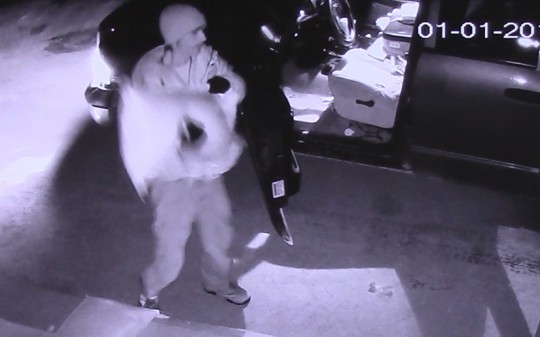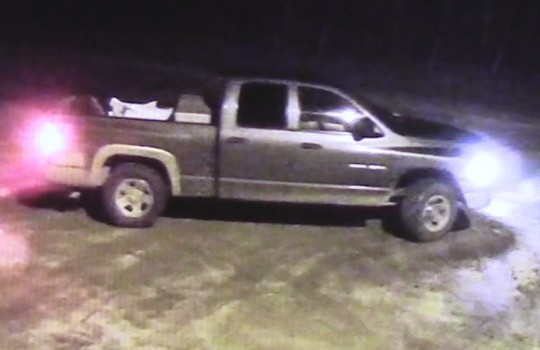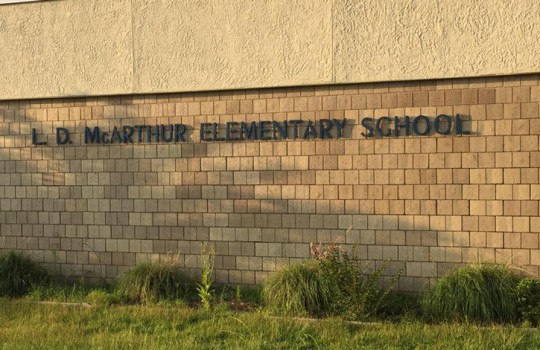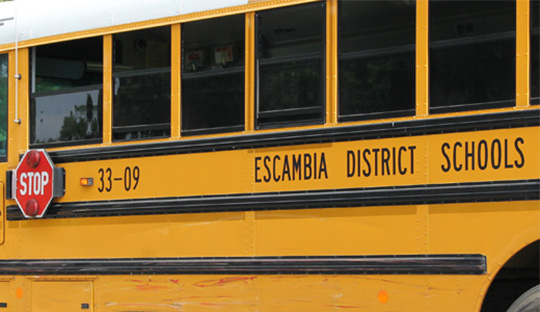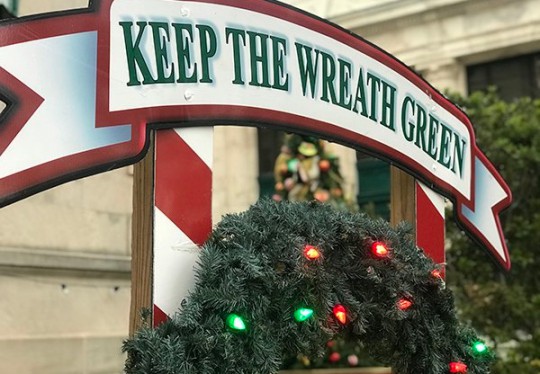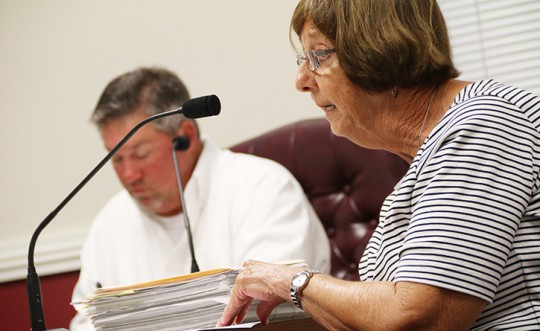What to Do With Your Holiday Plants
January 4, 2018
by UF/IFAS Extension
People often give and receive decorative plants during the holiday season. Many of these plants can last long past the holidays, but only if you care for them properly.
Use the following tips to keep Christmas cactus, poinsettia, amaryllis, kalanchoe, and cyclamen healthy and vibrant long after the holidays are over.
Light & Water Conditions
Keep your holiday plants in bright, indirect light, such as a sunny window. You can also put plants under incandescent or fluorescent lamps if a room is too dim.
Keep the room temperature cool. The ideal temperature ranges are 65º–75ºF during the day and 50º –60ºF at night.
Make sure the plants are watered enough to stay evenly moist, but do not overwater. Even Christmas cactuses need to be regularly watered since they are not true cactuses.
Flowering
Most plants are already flowering when you give or receive them. Eventually the flowers will fade and you should remove them.
You can prepare some plants for next season’s flowering. Remember that plants like poinsettia and Christmas cactus need to be kept away from artificial light at night to stimulate flowering, usually beginning around October.
Amaryllis
 Since amaryllis is a bulb, it easily flowers if you force the bulb. After the last flower fades, remove the bloom stalk, but let the leaves continue to grow. Keep amaryllis under bright light and fertilize it regularly.
Since amaryllis is a bulb, it easily flowers if you force the bulb. After the last flower fades, remove the bloom stalk, but let the leaves continue to grow. Keep amaryllis under bright light and fertilize it regularly.
In late summer, the leaves will die and the bulb will go into a resting stage. Reduce the amount of water it receives, and store the bulb in a cool, dry place for two to three months.
Begin watering again, and the bulb should reflower in four to six weeks.
Poinsettias
Poinsettias are hard for home gardeners to force to reflower.
When the poinsettia begins to drop its leaves, this signals the start of its resting stage. At this time, only water the poinsettia often enough to keep the stems and roots from drying out.
In April, prune the stems to six inches high, resume a regular watering and fertilization schedule, and place it where it will receive bright light that is not direct.
Planting
Most holiday plants are cold-sensitive, so only people in the southern part of Florida can consider planting their holiday plants outdoors without too much worry. Residents in northern parts of Florida can try growing their plants outdoors, but will most likely need to pay attention to weather reports and have some way of protecting plants from the cold.
Select the plants that have remained healthy and lush, and plant them after the chance of frost is past.
Look up plants in our Garden A-Z index or look for related articles on EDIS to find specific growing conditions your plants need outdoors.
Poinsettias
 Plant your poinsettia in a sunny spot that will not receive artificial light at night. The soil should be well drained.
Plant your poinsettia in a sunny spot that will not receive artificial light at night. The soil should be well drained.
Cut off fading bracts, leaving four to six inches of stem on the branches. Mulch around the plant, and keep it well watered during establishment.
Fertilize monthly from March to October in South and Central Florida or May to September in North Florida.
Prune regularly during the growing season to keep the poinsettia from looking “leggy.” Stop pruning in September, and flower buds will form in October.
If the plant was damaged by cold, cut it back to 12–18 inches off the ground or to living tissue in the spring after the chance of frost is passed.
NorthEscambia.com photos, click to enlarge.
Honor After All: Man Settles Up For Corn Taken From Farmer
January 4, 2018
UPDATE 1/4/2018 10:15 a.m. — Walnut Hill farmer Wes Eicher says it turns out there is good in the world after all. He said that after the photos and video in this story went public, the pictured man’s boss paid up for the stolen corn. And he even paid extra which Eicher is donating to a local charity. The man will be stopping by later to apologize. Eicher said he was told the man had been involved in an argument on the phone and simply forgot to pay for the corn. Eicher is dropping his complaint with the Escambia County Sheriff’s Office and no charges will be fled.
PREVIOUS STORY:
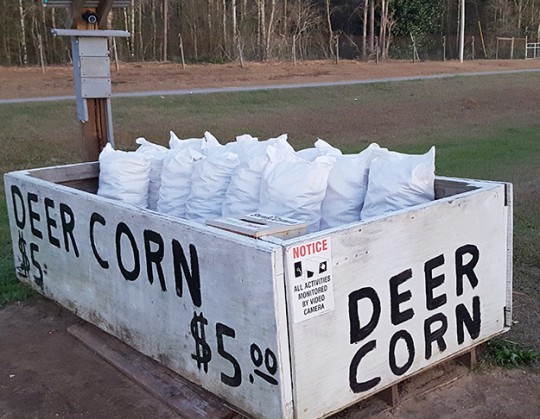 Just before 6 p.m. Tuesday, the man pulls up the farmer’s roadside location on South Highway 99 near Eicher Road. He appears to check sales bin near the road and find it to be empty. He then pulls his Dodge Ram 1500 pickup up to the building and steals the final four remaining 50 pound bags of deer corn from a pallet. He leaves without making payment in an honor box.
Just before 6 p.m. Tuesday, the man pulls up the farmer’s roadside location on South Highway 99 near Eicher Road. He appears to check sales bin near the road and find it to be empty. He then pulls his Dodge Ram 1500 pickup up to the building and steals the final four remaining 50 pound bags of deer corn from a pallet. He leaves without making payment in an honor box.
Anyone with information on the theft is asked to call the Escambia County Sheriff’s Office at (850) 436-9620.
The complete surveillance video is at the bottom of this page. Note that the video date is incorrect; the theft occurred January 2.
Images for NorthEscambia.com, click to enlarge.
McArthur Elementary Evacuated Due To Smell Of Smoke From Heater
January 3, 2018
The smell of smoke led to the evacuation of at least one wing of McArthur Elementary School on Ten Mile Road Wednesday afternoon.
Escambia Fire Rescue traced the smell to dust in a heating unit that was activated for the first time this year. While a light smoky haze was reported in the building, there was no sign of a fire.
Students were allowed back in the building in under 30 minutes.
File photo.
Escambia Schools Cancel Outdoor Activities Through Friday
January 3, 2018
The Escambia County School District has extended the cancellation of all outdoor sports and activities for Thursday and Friday due to the cold temperatures.
All district outdoor sports and activities will resume on Saturday.
“District schools and transportation will maintain their regular schedules. This only affects outdoor activities and sports,” Superintendent Malcolm Thomas said.
“We are continuing to monitor weather predictions and these cancellations are to help limit exposure to low temperatures and wind chill for our students and their families,” said Thomas. “We appreciate everyone’s continued attention to the need to dress students appropriately while walking to and from school, or waiting at bus stops.”
NorthEscambia.com file photo.
Farmers Use Pink Cotton Bales To Spread A Message Of Hope
January 3, 2018
Farmers across North Escambia are spreading a message of hope with huge pink cotton bales.
The plastic bale wraps are pink — really, really John Deere pink. The pink cotton bales have lined the highways for weeks as they await transportation to the cotton gin. John Deere makes the pink bale wrappers available for breast cancer awareness and a way for farmers to show support for those battling breast cancer.
“It’s a way for farmers to raise awareness about breast cancer,” Robert Godwin, manager of West Florida Gin, said. “About a third of the bales we take in this year will be the bright pink.”
Godwin said the pink wraps, at about $12-14 per bale, don’t cost the producer any more than the traditional yellow.
“It’s just a visible way for farmers to show their support.”
Pictured: Cotton is baled and wrapped in pink wrappers along Highway 97 in Walnut Hill. NorthEscambia.com photos, click to enlarge.
Wreath Fire Safety Campaign Ends With 10 Red Bulb Fires
January 3, 2018
The annual “Keep the Wreath Green” fire safety campaign ended December 31 with 10 red bulbs, each representing a residential structure fire with damage that displaced an occupant.
A fire Saturday night was the final red bulb. One person was displaced by the fire about 9:40 p.m. at the Fairfield Lake Apartments on Highway 98. None of the fires were in the immediate North Escambia area.
During the month-long campaign, five-foot wreaths were on display at 18 county fire stations and five city fire stations, with wreaths also placed outside Escambia County’s Ernie Lee Magaha Government Building downtown, the Escambia County Public Safety Building, Pensacola City Hall and Cordova Mall near the food court entrance. Each time firefighters respond to a residential fire with damage, a green light bulb was replaced with a red one to remind citizens of the dangers posed by fires in residential home.
The complete list of red bulb fires is as follows:
1. 9700 block of Aloha Lane in Beulah
2. 8300 block of Gardenia Circle
3. 3600 block of West Cervantes
4. 900 block of Bremen Avenue
5. 7200 block of North Palafox Street
6. 6200 block of Trent Street
7. 5700 block of Wickford Lane
8. 3000 block of Pelican Lane
9. 100 block of Ariola Drive
10. 8100 Highway 98
Escambia County residents can call (850) 595-HERO for fire safety information and information about obtaining a free smoke detector.
New Year, New Laws In Effect In Florida
January 3, 2018
Six bills from the 2017 legislative session became effective with the arrival of the New Year.
The changes range from eliminating a public-transit commission to streamlining how unmarried and divorced parents agree to time-sharing arrangements for children.
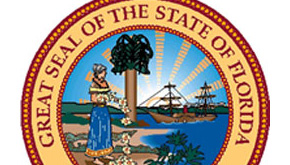 Also with the start of 2018, Florida’s minimum wage increased Monday by 15 cents, to $8.25 an hour. That, however, was not tied to legislation. Voters in 2004 passed a constitutional amendment that requires the Florida Department of Economic Opportunity to annually calculate the rate based on changes in a federal consumer price index.
Also with the start of 2018, Florida’s minimum wage increased Monday by 15 cents, to $8.25 an hour. That, however, was not tied to legislation. Voters in 2004 passed a constitutional amendment that requires the Florida Department of Economic Opportunity to annually calculate the rate based on changes in a federal consumer price index.
The laws taking effect this week were among 234 bills approved in 2017 by the Legislature and signed by Gov. Rick Scott. Most new laws went into effect July 1, the start of the state’s fiscal year.
Here are the laws that just hit the books:
— HB 647, a local bill that dissolved on Dec. 31 the Hillsborough County Public Transportation Commission, an independent special district. The commission was created to regulate such things as taxis, limousines and wrecker services.
The measure was considered a victory for rideshare companies such as Uber and Lyft. Lawmakers during the 2017 session also passed a measure that created statewide regulations for rideshare companies, something the fast-growing industry sought so it wouldn’t have to operate under a variety of rules imposed by local governments. The commission’s breakup date coincided with the expiration of an agreement with rideshare companies operating in Hillsborough County.
— SB 590, a bill that makes changes in how Florida handles child time-sharing arrangements between unmarried or divorced parents.
— HB 435, a bill that revises rules regarding international banking corporations, including issues related to licensure and record-keeping.
— HB 437, a bill that is tied to HB 435 and creates public-records exemptions involving the Office of Financial Regulation. The exemptions deal with new entities known as “international trust entities” and “qualified limited service affiliates.” It prohibits the Office of Financial Regulation from releasing such things as personal identifying information of customers or shareholders.
— SB 800, a bill that requires health insurers and health maintenance organizations to offer “medication synchronization” to customers at least once a year. Under medication synchronization, customers are able to align refill dates of prescriptions.
— HB 911, a bill that makes a series of changes related to rules and licensure for public insurance adjusters.
Lawmakers had approved a seventh bill slated to go into effect with the New Year. That bill would have required warning labels on state Lottery games. But Scott vetoed the measure (HB 937) for imposing “burdensome regulations” on the games and retailers. The bill was one of 11 Scott vetoed last year.
by Jim Turner, The News Service of Florida
Opinion: Thanks For Helping Century In Tornado Recovery Efforts
January 3, 2018
by Debbie Nickles, former Century Town Planner
As 2018 begins, it is time to reflect back on the past two years as the Town of Century’s disaster recovery is on its way to completion. As a result of the February 15, 2016, EF-3 tornado that whipped through parts of the town, it is time to thank all the players who have contributed to the recovery process.
Immediately after the event, the American Red Cross was in Century serving food and water to several neighborhoods. In addition, Escambia County Sheriff’s Department officers were on the job making sure everyone was safe and secure. Several church groups traveled to Century and contributed to the clean-up of neighborhoods and streets. I remember a group from Hillcrest Baptist Church clearing streets of trees and other vegetative debris as well as removing fallen trees from many rooftops.
The Escambia County Public Safety Division and the Building Inspections and Permitting Department were present to assess the damages to the housing stock and planning recovery efforts in concert with the town. The county’s neighborhood Enterprise Division was there to determine the need for housing rehabilitation and reconstruction. Representatives from the Escambia County Perdido Landfill were there to help the town deal with the tons of trees and other vegetative debris by providing equipment and manpower.
Once damage assessments were complete, several agencies were there to start the recovery process. The town is most grateful for services provided through United Way of Escambia County, Be Ready Alliance Coordinating for Emergencies (BRACE), Legal Services of North Florida, Inc., United Methodist Ministries, St. Vincent de Paul and Catholic Social Services.
Without the services provided through these agencies, many of the tornado victims in Century would not have been able to recover.
The Neighborhood Enterprise Division, applied for and received funding through the State Housing Initiatives Partnership Program, as administered by the Florida Housing Finance Corporation. SHIP funds were to be used to rehabilitate and/or reconstruct housing units damaged and/or destroyed by the tornado. To date, the County’s Neighborhood Enterprise Division has expended approximately $2 million in housing assistance in the Century area.
Recovery would not have been a reality without the County’s participation since a large majority of the homeowners did not have private insurance. Pensacola Habitat for Humanity partnered with Escambia County and the Escambia County Housing Finance Authority in order to construct the new homes. For several months after the disaster, the Escambia County Building Inspections and Permitting Office had staff members working at town hall to issue building permits.
The Town of Century could not have recovered without the aid and assistance from these partnerships! I am sure I may have forgotten someone—please know this was not intentional. A big thank you to all who answered the call as Century is now on its way to full recovery!
NorthEscambia.com file photo.
Tax Collector Offers Partial Payment Plan for Property Taxes
January 3, 2018
Escambia County Tax Collector Scott Lunsford is reminding taxpayers there is help for those who may need to make partial payments for their 2017 property taxes.
If a property owner decides to make partial payments, the following information applies:
- Property owner must submit an application (found on the back of the tax bill, available at the tax collector’s office and on our website) with initial partial payment.
- Partial payments are accepted for current year taxes only from November 1 until March 31.
- No discount allowed for partial payments.
- A $10 processing fee deducted from each partial payment.
- Partial payments are not accepted after March 31, and any remaining balance as of April 1 is delinquent and subject to all applicable penalties and fees.
For additional information, visit escambiataxcollector.com/property-tax/payment-options
UF Financial Expert: Be ‘SMART’ About Your New Year’s Resolutions
January 3, 2018
If you dread looking at your bank account balance, you might consider adding fiscal responsibility to your list of New Year’s resolutions.
And when it comes to setting goals, especially financial ones, it’s important to be specific, according to a University of Florida expert.
“If you want to make a change, it helps to have a SMART goal. SMART stands for specific, measurable, attainable, realistic and time-bound,” said Jorge Ruiz-Menjivar, assistant professor of family, youth and community sciences in the University of Florida Institute of Food and Agricultural Sciences.
“So instead of saying, I want to start saving money this year, make your objective more concrete. A better resolution would be something like, I will set up an automatic transfer of $25 into my savings account each month so that I have $300 saved by the end of the year,” he explained.
Ruiz-Menjivar has these tips for making better financial resolutions in the New Year:
Identify your unhealthy money habits.
Do you go shopping without a shopping list? Do you hate budgets? Do you use a credit card for any and all purchases? If so, you may have some unhealthy money habits. Targeting a specific habit you want to change is the first step toward changing your behavior for the better, Ruiz-Menjivar said.
Think about positive habits that you can start now to help you toward long-term goals.
“Something you can change in the short term is how you save money and for what purpose. For example, it’s a good idea to have a rainy day fund equal to three to six months of your regular income. You can start doing small things now to reach that goal, such as setting up automatic payments into a savings account—the Florida Saves program is a great way to set these small, short-term goals,” Ruiz-Menjivar said.
Know your weak spots.
“There are a few common barriers people encounter when they are trying to change their financial habits,” Ruiz-Menjivar said. “Being disorganized with your recordkeeping is a common one. Keeping your information—especially about your income and spending—in order will help you stay on track for reaching many financial goals.”
Often times, people don’t think “big” enough when it comes to their money, Ruiz-Menjivar explained. “If you are only planning month-to-month, you won’t get to where you want to be in 10 years,” he said. “Time perspective does matter; consumers with a longer time horizon tend to think and plan potential purchases in the near and far future.”
Create an environment that enforces healthier habits.
There are several things you can do to create the conditions for financial success.
- Track income and expenses with a tool that works for you. Some people like to write everything in a calendar, others save receipts, some prefer a spreadsheet. There are a lot of apps out there that let you keep tabs on everything from your phone.
- Become a “convenience user” of credit cards: you use the card to enjoy the perks, such as miles or cash back, but you don’t carry a balance over months
- Set up your bank account to transfer money automatically to a savings or retirement account.
by UF/IFAS Extension.




